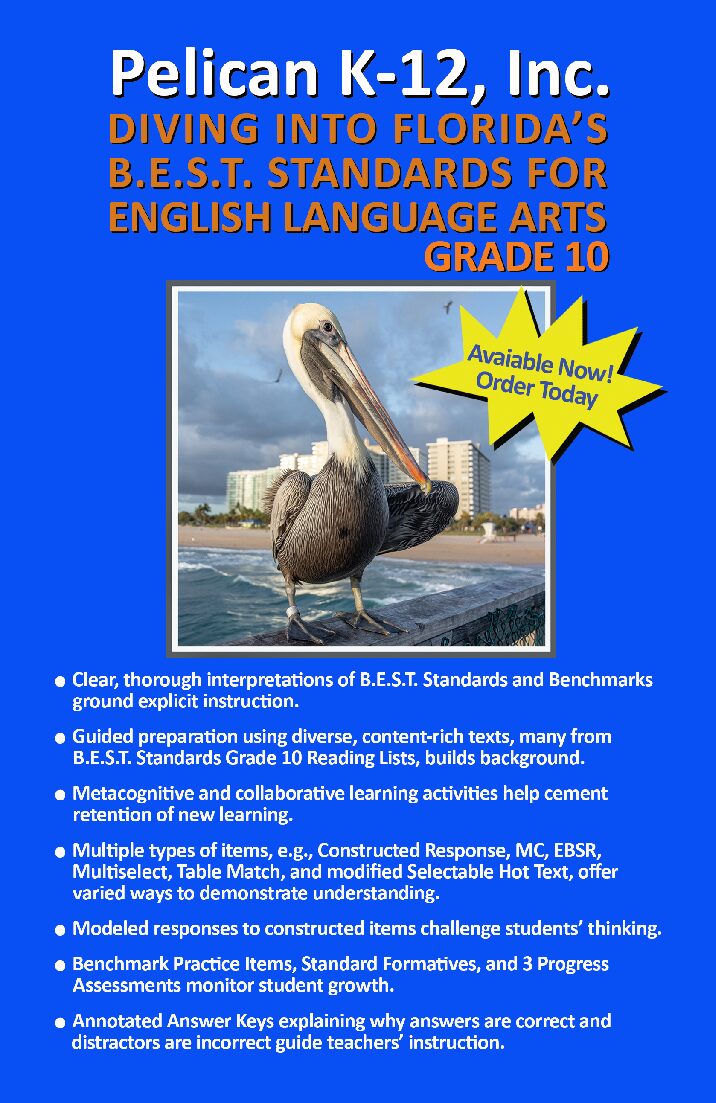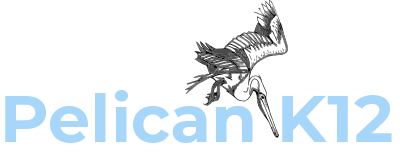Pelican K12

Request A Quote For Print on Demand
Pelican K-12, Inc. offers Print on Demand for Diving Into Florida’s B.E.S.T. Standards for English Language Arts Grade 10 student books.
Please allow 14 Business days for delivery.
Code# PELICANK12ELA10
Digital Teacher Resources PDF
Credit Card Orders are placed directly through Pelican K-12, Inc.
Pelican K-12, Inc.
Phone: 954.465.1889
Email: kbechert@pelicank12.com
www.pelicank12.com
In the 2022-2023 school year, teachers and students will make the seismic shift from the Language Arts Florida Standards (LAFS) to the Florida’s B.E.S.T. Standards for English Language Arts. These new standards differ drastically in theory, structure, and content from the previous ones. To help both teachers and students better understand the demands of these new learning goals, Pelican K-12, Inc. has developed a comprehensive guide to understanding and applying these grade level requirements. The company decided to start with the critically important tenth grade. Appropriate instruction during this pivotal year can turn struggling students around in time to graduate and, at the same time, lead on-grade level students to new heights of comprehension and communication.
Diving into Florida’s B.E.S.T. Standards for English Language Arts, Grade 10 is NOT a test preparation book. Instead, the authors have written a thorough explanation of the NEW Florida literacy standards and their accompanying benchmarks. In an easy-to-follow structure, students are walked through each standard and its accompanying benchmarks as laid out in the B.E.S.T. Standards Map found in the state standards document. Following explicit instruction, application of the benchmark demands is modeled for the students using content-rich texts. Then in partnerships or small groups, students work collaboratively to practice the skills needed to answer constructed responses, demonstrating understanding of the complex, grade-level texts. To make sure all students can be successful, the instruction of each benchmark is chunked into manageable pieces and includes brain breaks to support student ownership of their learning.
At the end of each reading and vocabulary benchmark’s lesson, students are presented with multi-genre texts, many from the B.E.S.T. Standards grade 10 reading list, to read and then various types of objective items to practice. Teachers should encourage students to revisit the instructional pages in the book if they have difficulty answering these practice items.
For the Communicating through Writing Standard, students learn how to review another student’s writing and offer constructive feedback before practicing responses to text-based writing tasks. Once a class has learned about each of the benchmarks attached to a standard, they are presented with a formative assessment of their newly acquired knowledge of that standard.
FlTeachers are encouraged to have students track their growth and understanding by completing the group activity at the end of each formative. This metacognitive practice will be a key factor in the retention of knowledge and skills. In addition to this on-going evaluation of students’ understanding, the authors have included three progress monitoring tools. They are placed strategically throughout the book: the first one at the beginning of the book can be used to establish a baseline and help the teacher set class instructional goals and individual learning goals, the second one at the end of the reading strand can be used to check the students’ growth and assess where reteaching is needed, and the third one located at the end of the book can be used as an appraisal of how well students can intertwine the requirements of the reading, communication, and vocabulary strands to comprehend rich text and convey its significance to others in an appropriate style and voice.
While writing Diving into Florida’s B.E.S.T. Standards for English Language Arts, Grade 10, the authors utilized the ELA Expectations and Benchmark Clarifications found in the state standards document. Texts chosen are based on the literary time periods as identified in the standards, and many appear on the tenth grade reading list found in the document. Additionally, the writers have strived to include diverse voices and perspectives in the texts.
The authors realize that not only do these standards and benchmarks present a learning curve for students, but teachers will likewise be challenged by the changes. To support teachers in understanding the standards and benchmarks better and to be able to explain the reasoning behind correct and incorrect responses, Pelican has developed a PDF of Teacher Resources which is available upon purchase of 25 student texts. This guide contains a Note to the Teacher; Annotated Answer Keys for Practice Items, Formative Checks for Understanding, and Progress Monitoring; and a list of sources for any texts used in the book.
The authors hope teachers and students will find the book engaging and will use it as a stimulus for authentic discussion and learning in the classroom. We encourage you to take the dive. Come on in; the water is fine.
About Us
View Online Sample
